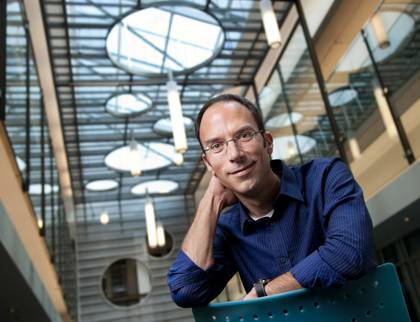Georg Vanberg: A Social Science Pedigree (and Sports Luck)
New political science faculty member tracks how coalition governments learn to compromise

Duke athletic teams have a golden future ahead, if the track record holds for new political science professor Georg Vanberg. But first, his hiring is good news for students wanting to know that compromise within political institutions can work well.
This fall, Vanberg started teaching political science at Duke. His research provides a global study of political institutions, including judicial, constitutional and legislative politics. He's particularly known for his studies of coalition politics and how the design of the institutions -- from European parliaments to the U.S. Supreme Court -- shape negotiations and bargaining between members of those institutions.
"My interests revolve around trying to understand how political institutions -- the 'rules of the game' that define how collective decisions are made -- shape political outcomes," says Vanberg, who is also associate editor of the journal Public Choice.
The social sciences come naturally for Vanberg. His father was an economist at George Mason. Growing up as a "faculty brat" had an impact on the younger Vanberg.
"I knew early on what I wanted to do," he says. "As a child, it was obvious to me that my father absolutely loved his job -- that it was rewarding, challenging, never boring. Our house was always full of visiting academics from all over the world. Discussions around the dinner table wwere the order of the day. So I think I never really imagined that I'd do anything else."
Today he and his father, now retired, even collaborate on research papers.
Vanberg earned bachelor degrees in economics and government from William & Mary, and a master's degree and Ph.D. in political science from the University of Rochester.
After 14 years as a professor, Vanberg says that academic life is much like he expected, including the challenges and rewarding moments of the research process for his two books and numerous papers. One book, "Parliaments and Coalitions," received the Richard F. Fenno, Jr. Prize for the best book published in legislative studies in 2011.
What has surprised him is how much he has enjoyed teaching.
"I have been lucky to have encountered so many top-notch students at both UNC and Duke. The enthusiasm of students is infectious. They bring different perspectives, and often ask insightful questions I haven't thought about," he says.
"I suppose to me, the most important thing I want my students to understand is that paying attention to the 'rules of the game' is much, much more important than worrying about day-to-day political decisions within these rules," he says. "It is inevitable that in a society comprised of individuals with diverse preferences and values, there will be disagreement over specific public policy questions.
"But a critical question for us as citizens in a constitutional democracy should be how we can create a political process that -- over time -- allows us to live together harmoniously in a way that makes it possible for many of us to pursue our individual values. And that's primarily, although not exclusively, a question of how we design our political institutions."
Now, about that sports luck: Within the first two years of joining the faculties of Florida State in 1999 and UNC-Chapel Hill in 2003, those schools won national championships in football or men's basketball, Vanberg said. In between, Vanberg moved to the University of Wisconsin at Milwaukee in 2001, and within two years the small school's men's basketball team made the NCAA tournament for the first time in 14 years.
Outside of work, Vanberg's focus is life at home with his wife Julia and their two young children, ages 3 and 6, as well as his two hobbies: classical music and running.
Professionally, he says, coming to Duke has been a good move.
"The intellectual environment at Duke -- not just in political science, but across the social sciences and the law school -- is incredible exciting, lively, and fits my intellectual interests very well," he says. "So it was natural for me to jump at the opportunity to be a part of it."